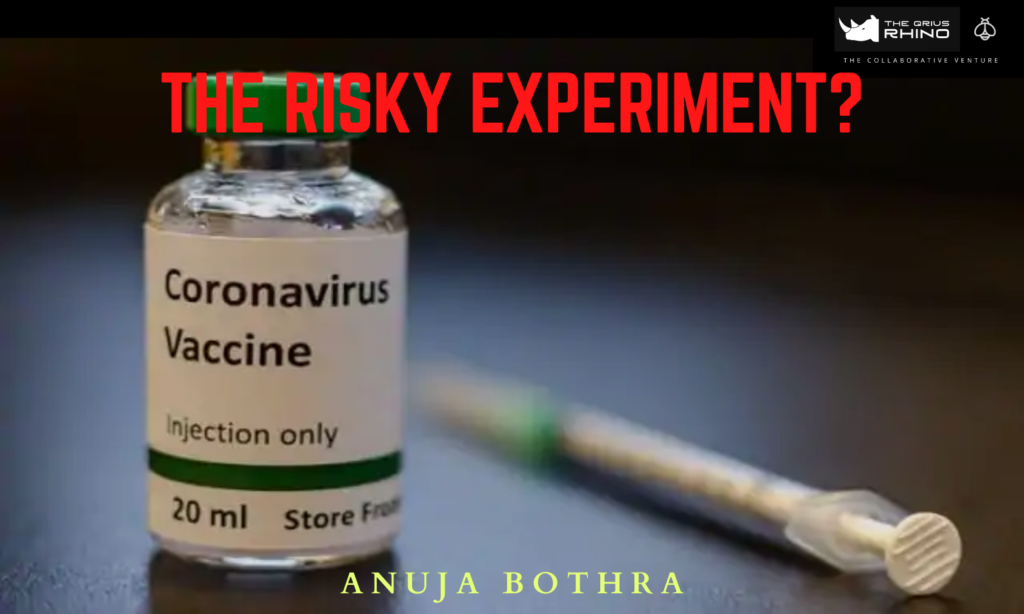
Merely six months after identifying SARS-CoV-2 as the causative agent for COVID-19, researchers are on the verge of developing a vaccine to fight it. Vaccines normally take years, if not decades, to reach the general population. Never before have vaccines for pathogens entered the final stages of the clinical trial as rapidly as the candidates for COVID-19. This raises a worrisome question: Will the rush to develop a vaccine for SARS-CoV-2 compromise on the safety of it?
The colossal impact of the coronavirus has driven research teams around the world to join the hunt. Nearly six months ago, the SARS-CoV-2 genome sequence was uploaded by Chinese scientists. Fortunately, since scientists had previously worked with the SARS virus that caused an outbreak in 2003 and the MERS virus in 2012, they got a head start in the COVID-19 vaccine development. The earlier projects had identified the spike protein of coronavirus to be a strategic choice for vaccine development and this made scientists more prepared to fight coronavirus than any other virus family. The spike protein is the immunodominant part of the virus as it triggers the strongest immune response.

Traditional ways of making a vaccine had to do with weakening or inactivating the virus itself, making it a lengthy process. However, the evolved ways of vaccine development have made the process less time consuming- the genome sequence of the virus is to be known and target components can be strung together to make an effective vaccine.
With cutting-edge approaches, different organizations have come up with various candidates and some of them are in phase 2/3 and phase 3 of the clinical trials. But SARS-CoV-2 causes an acute infection, unlike HIV that causes a chronic infection. This means that most of the people will recover from the disease on their own and a vaccine for COVID-19 can aim to induce a vanquishing response to protect all people.
Now let’s focus on the Oxford-AstraZeneca vaccine candidate which is in the final leg of trials. In layman’s words, they have expressed the gene for the spike protein in another harmless virus which acts as the carrier. In the human host, an immune response is triggered against the spike protein upon entry of the carrier. So far, it has been established that the vaccine creates a strong immune response in 90% of volunteers after a single dose of vaccination. The rest 10% have to be given a booster dose to show notable response. Apart from this, there are mild side effects like fever and headaches which can be treated with paracetamol. Sounds promising, right?
Here comes the interesting part. The vaccine developers have not yet been able to establish if the immune response generated by the vaccine will be sufficient to act against SARS-CoV-2. And how could they? The volunteers of the vaccine need to be naturally infected by the virus in order to prove its performance. This is why it normally takes years to roll out a vaccine in the market, depending on when the volunteers contract the disease and how they respond to it.
“This is a huge experiment and no one knows how it’s going to turn out,” said James Le Duc, the director of the University of Texas Medical Branch’s Galveston National Laboratory.
But in the current case, vaccines are to be mass-produced in millions of doses, without knowing if the vaccine will effectively help people tackle the virus or not. In a way, the pharma industry is taking a huge gamble by investing millions of dollars on a vaccine that has not yet been proven to be 100% effective.
An alternative way out was proposed by 125 academics, doctors, scientists and epidemiologists-to conduct human challenge trials. This trial deliberately exposes human volunteers to the virus after they are vaccinated, in order to check the performance of the vaccine in combatting the disease, which is ethically not allowed. However, an exception is expected to be made for this pandemic as HCT can speed up the process of vaccine development.
In challenge trials, with careful monitoring, measured viral loads and many other restrictions, the virus is exposed to young, healthy volunteers who have developed antibodies since vaccination. This removes the wait for a real-world situation to play out and directly tells us whether the vaccine works or not.

Thus, it is obvious that the hunt for an effective vaccine is a risky experiment and this, in turn, has doubled the responsibility of the regulators to make sure the quality and safety of the vaccine is not compromised with.
By Anuja Bothra (Blogger, the Biobee)
References:
- https://www.statnews.com/2020/07/31/covid-19-vaccine-amazingly-close-why-am-i-so-worried/
- Youtube Video Courtesy : https://www.youtube.com/watch?v=CS2M0j-oERc&feature=youtu.be
Cover Image Source:
https://images1.livehindustan.com/uploadimage/library/2020/07/30/16_9/16_9_1/coronavirus_vaccine_1596121808.jpg.
About the author:
I have completed B.Sc. Microbiology (Hons.) at St. Xavier’s College, Kolkata. Now I manage my independent blog called ‘The Bio Bee’ where I write mostly about the interesting developments in the field of Biosciences and create awareness about environmental issues. I spend most of my time-solving sudokus, puzzles and riddles, and I also love reading fiction books.
Other blogs of the author can be found here.
Our Collaboration:

This blog marks the fourth collaboration between The Qrius Rhino and The Bio Bee. The Bio Bee is a Science blog like us, that is run by Anuja Bothra, the author of this article. She writes on various interesting and thought-provoking topics and we are proud to introduce her to our readers through her unique content. You should visit her blog page, The Bio Bee. Also, do follow the Instagram page for updates regarding the latest posts. Other collaboratively published blogs can be found here.